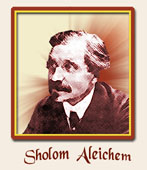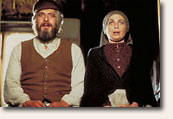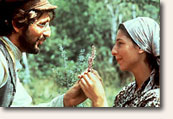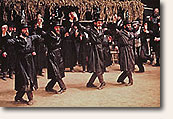
Fiddler on the Roof: Fiddler Facts Share the following background information with your cast, crew and production staff to provide a better understanding of and appreciation for this landmark production. |
 Fiddler on the Roof,
based on the short story "Tevye and His Daughters" by Sholom
Aleichem, was one of the first musicals to defy Broadway's established rules of
commercial success. It dealt with serious issues such as persecution, poverty,
and the struggle to hold on to one's beliefs in the midst of a hostile and
chaotic environment. Criticized at first for its "limited appeal",
Fiddler on the Roofstruck such a universal chord in audiences that it
became, for a time, the longest running production in the history of Broadway. Fiddler on the Roof,
based on the short story "Tevye and His Daughters" by Sholom
Aleichem, was one of the first musicals to defy Broadway's established rules of
commercial success. It dealt with serious issues such as persecution, poverty,
and the struggle to hold on to one's beliefs in the midst of a hostile and
chaotic environment. Criticized at first for its "limited appeal",
Fiddler on the Roofstruck such a universal chord in audiences that it
became, for a time, the longest running production in the history of Broadway.
Set in 1905, Fiddler on the Roof takes place in Anatevka, a small Jewish village in Russia. The story revolves around the dairyman Tevye and his attempts to preserve his family's traditions in the face of a changing world. When his eldest daughter, Tzeitel, begs him to let her marry a poor tailor rather than the middle-aged butcher that he has already chosen for her, Tevye must choose between his own daughter's happiness and those beloved traditions that keep the outside world at bay. Meanwhile, there are other forces at work in Anatevka, dangerous forces which threaten to destroy the very life he is trying to preserve.  Fiddler
on the Roof opened on September 22, 1964 with Zero Mostel in the leading
role. It ran for 3,242 performances at the Imperial Theatre and opened the door
for other musicals to deal with more serious issues. Fiddler
on the Roof opened on September 22, 1964 with Zero Mostel in the leading
role. It ran for 3,242 performances at the Imperial Theatre and opened the door
for other musicals to deal with more serious issues. The 1971 screen version featured Norma Crane, Molly Picon, and Topol.
Deeper Background The characters of Tevye the dairyman, his unimpressed wife, his five daughters and other dwellers in the village of Anatevka, first came to attention in the stories written in Yiddish by the popular fiction writer who called himself Sholom Aleichem (literally "peace be with you" in Hebrew). The stories appeared in vairous publications in eastern Europe and then spread to Yiddish publications in America and elsewhere, in the years 1905 through 1910. Over the years, they became world favorites in many languages. This continuing interest was vastly accelerated when in 1953 Arnold Perl, a long-time admirer of Sholom Aleichem's work, and that of I. L. Peretz and other popular Yiddish writers, put together a series of short plays. They were based on Aleichem's stories, including one by Peretz, which under the title of "The World of Sholom Aleichem" dramatically vivified the life of the Jewish "Shtetels" in Tzarist Russia, a picturesque, though impoverished life that had disintegrated considerably as a result of World War I and was thoroughly destroyed in World War II. The success of "The World of Sholom Aleichem" encouraged Arnold Perl to plough the same field a bit more, and in 1957 Perl brought out a play about that indomitable milkman of Anatevka, which he called "Tevye and his Daughters." This prompted Joseph Stein to believe that the Tevye stories could be made into a musical, and Fiddler on the Roof was the result.
|
|||||
HOME


